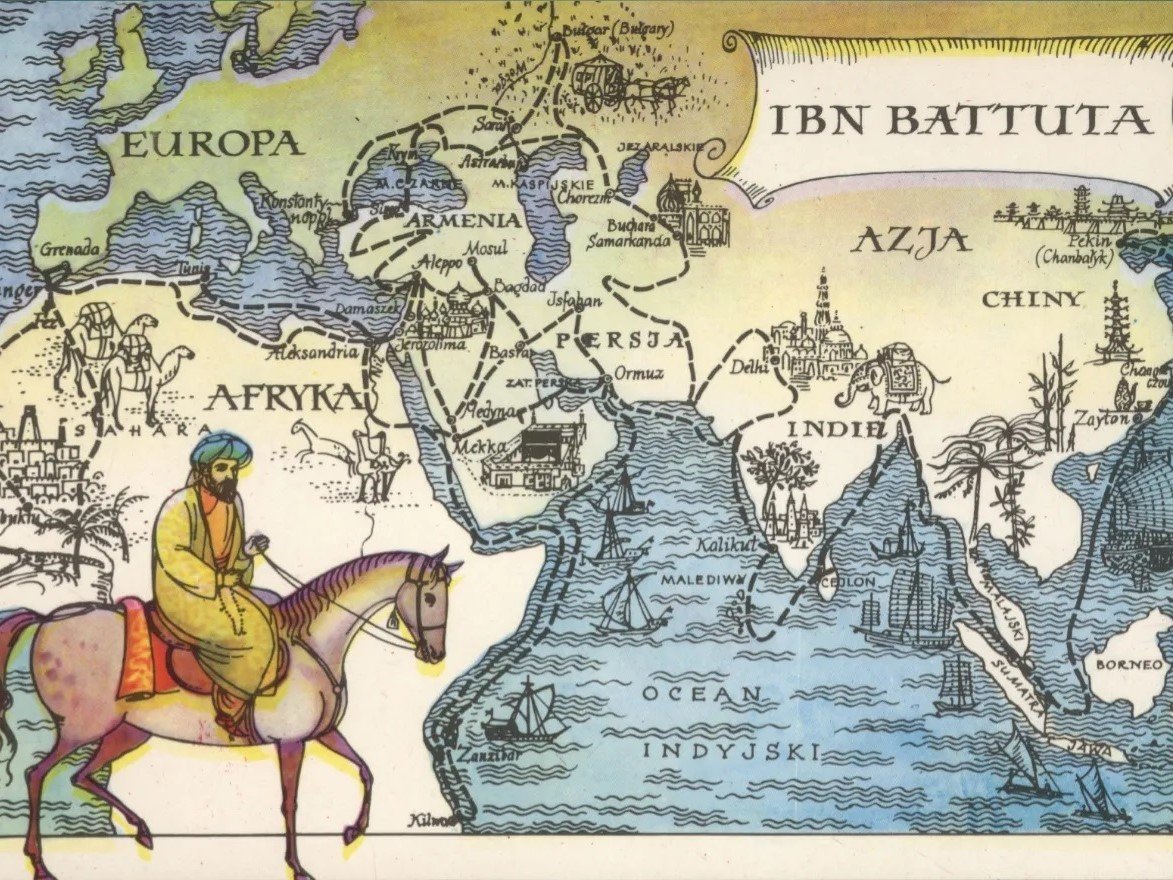Ibn Battuta Earns Quadruple Platinum Traveler Status
Ibn Battuta (1304-1369) was the most well traveled man of the Middle Ages. For 30 years, he journeyed throughout Africa, the Middle East, and Asia. There were no planes, no trains, no automobiles, just his two feet, many camels, probably a donkey or two, all putting one foot in front of the other.
One of the five pillars of Islam is to make the hajj, a pilgrimage to the holy city of Mecca, at least once in each believer’s life. At the age of 21, Ibn Battuta set out to make the hajj in 1325 from his home city of Tangier, Morocco. On the way, he stopped in Cairo, Egypt to study Islamic law. This would be useful, as he would serve as a judge in courts all over the Islamic world.
After completing his first hajj, Ibn Battuta decided to continue traveling rather than return home. He toured the Middle East, visiting Baghdad and crossing into Persia. There he encountered Sufi mysticism, which was a very different way to practice Islam than he had seen all his life. Then he returned to Mecca to complete his second hajj.
He then took a boat to the Horn of Africa, sailing down its eastern coast. Ibn Battuta marveled at the cosmopolitan marketplaces of Mogadishu, a key trading hub with goods from all across the Indian Ocean. Next he crossed the equator, noting that he was now in the southern hemisphere, not bad geographical knowledge for the year 1331 and no GPS. He went as far south as Kilwa, Tanzania, which he described as "one of the most beautiful and well-constructed towns in the world."
The yearly monsoon winds arrived and blew him back north to Arabia, where he completed his third hajj. Ibn Battuta then joined a Turkish Silk Road caravan and met up with the Mongols of the Golden Horde while traveling in Central Asia. On the way befriended a khan and escorted the khan’s wife, a Byzantine princess, back to Constantinople.
Everyone knew that the sultan of Delhi was wealthy, generous, and happy to employ legal scholars, so Ibn Battuta set his sights on India. He took out a loan to purchase a huge amount of treasure to present to the sultan as a gift. The sultan turned around and gave Ibn Battuta an even more ginormous gift of treasure to show his gratitude, and made him qadi, the official magistrate of his court.
In 1341, the sultan of Delhi nominated Ibn Battuta as his envoy to the Mongol court in China. This sounded like a dream posting for a veteran traveler, but it didn’t go well. His party was ambushed, and he was robbed of everything but his pants. When he finally made it to Mongol China, he called it the “safest and best country for the traveler,” so you can assume that he was wearing more than just pants at that point.
In 1349, he finally returned home to Tangier. There he learned that both his parents had died, his mother a plague victim of the Black Death. Seeing no reason to sit around moping at home, he took a short trip up to Grenada in Spain. Back in Africa, he headed south to the Empire of Mali to Timbuktu, the city of gold. There, the sultan commanded him to return home and dictate his travels for a scribe to record.
During his 30 years on the road, he got married and divorced at least ten times and fathered an uncounted number of children. While certainly a traveler, he wasn’t really an explorer of uncharted lands. He journeyed along well-worn trade routes in the highly interconnected 14th century Islamic world, almost certainly earning Quadruple Platinum Travel Status and two free checked bags.
The travels of Ibn Battuta seem so extraordinary and exotic to modern people. He traversed the Earth, experiencing customs and cultures. Most medieval people never got farther than a day or two’s ride from where they were born.
Business travel can also seem exotic. Jetting off somewhere and posting pictures of your big meeting or fancy meal can engender envy among your colleagues. But less talked about is typing with one hand on your laptop, desperately trying to finish that email before you spill the tray of glop that the flight attendant called “dinner” with a straight face. That’s the real deal of business travel.
Travel smart; travel light.Carry on whenever possible. It’s the company’s money you’re spending, so be a good steward and spend wisely. But there have to be advantages to leaving your couch, TV, and family (missed in that order) behind to travel for work. Take advantage of your downtime to explore whatever corners of the world wherever work leads you. Except if you end up in Minnesota in the winter. Then just hang out in your jammies in the hotel.



